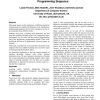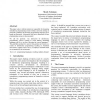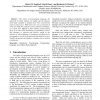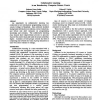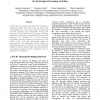120
click to vote
SIGCSE
2002
ACM
15 years 1 months ago
2002
ACM
This paper reports on the implication of different preferred learning styles on students'performance in the introductory programming sequence and on work in progress on how t...
128
click to vote
ACE
2003
15 years 3 months ago
2003
This paper seeks to inform instructors responsible for designing introductory programming courses within a university setting. In particular, guidelines for choosing programming l...
131
click to vote
FECS
2008
15 years 3 months ago
2008
- The choice of programming language, the approach by which students are taught and the software tools made available to students have been controversial issues in many ways. While...
142
click to vote
SIGCSE
1994
ACM
15 years 6 months ago
1994
ACM
An experiment in collaborative learning was conducted in two introductory programming courses at Loyola College in Maryland. Data collected included background information on stud...
103
click to vote
ITICSE
2003
ACM
15 years 7 months ago
2003
ACM
Computing may well become considered an essential part of a liberal education, but introductory programming courses will not look like the way that they do today. Current CS1 cour...
107
click to vote
ICALT
2003
IEEE
15 years 7 months ago
2003
IEEE
In this paper, we propose a framework for the design of learning activities, which follows the key idea of the “Learning-for-Use” model and adopts characteristics from the exp...
121
click to vote
ECLIPSE
2004
ACM
15 years 7 months ago
2004
ACM
Much research has been done on techniques to teach students how to program. However, it is usually difficult to quantify exactly how students work. Instructors typically only see ...
ITICSE
2005
ACM
15 years 7 months ago
2005
ACM
One of the largest barriers to learning programming is the precise and complex syntax required to write programs. This barrier is a key impediment to the integration of programmin...
